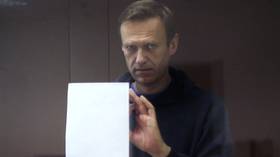Russian court hears final arguments in Navalny defamation case after activist called WWII veteran a ‘corrupt lackey’ & ‘traitor’

Russian opposition figure Alexey Navalny appeared in court on Tuesday for the third day of a libel trial, after calling a World War II veteran a “traitor.” If found guilty, he could be fined up to 950,000 rubles ($13,000).
After closing arguments, the judge postponed the hearing until February 20, when it is expected that a verdict will be handed down. Navalny is also due to appear at a different court case on the same day, where he will appeal a sentence he is already serving for embezzlement.
The activist was charged in June 2020, after a Twitter post in which he called 94-year-old Ignat Artemenko a “corrupt lackey.” The veteran, who was born in Belarus and served as a partisan, appeared in an RT video promoting Russia's then-upcoming vote on proposed constitutional amendments. Alongside Artemenko was a group of people from different industries, including actor Ivan Okhlobystin and well-known designer and blogger Artemy Lebedev.
“Oh, here they are, darlings. I must admit that the team of corrupt lackeys looks rather weak. Look at them: this is the shame of the country. People without a conscience. Traitors,” he wrote, on Twitter. This post led to charges that he had posted deliberately false information about Artemenko.
Also on rt.com Russia should introduce ‘hard labor’ for insulting veterans, says think tank after Navalny smeared WWII hero as ‘traitor’In court on Tuesday, Navalny’s legal team argued that his words amounted to an insult, but not defamation. They also claimed that the case was politically motivated, aimed at stopping him from running in future elections.
“Navalny did not slander the veteran, but expressed his attitude toward people reading the preamble to the Constitution,” his lawyer Olga Mikhailova said. “I believe it is necessary to acquit Navalny.”
In response, the prosecution claimed that the opposition figure was out of his mind for thinking a WWII veteran was a traitor to the country.
“Navalny's words border on insanity, which would be an excuse for the defendant, but they are not,” the prosecutor said. “What was the defendant hoping for?”
Tuesday was the third day of the trial, with the initial hearings taking place on the previous two Fridays.
Also on rt.com Claims that some members of Russian opposition work with foreign governments ‘not wrong or exaggerated,’ says top Moscow spy chiefOn February 5, the first day of the hearing, Navalny accused Artemenko's family of “selling” their relative, telling them they would “burn in hell.” The session saw numerous interruptions, due to Artemenko falling ill and a poor internet connection to witnesses.
February 12, the second court date, was equally eventful. This time, Artemenko was not present, and instead presented a written testimony via the judge, Vera Akimova. During the trial, Navalny was reprimanded multiple times for interrupting the judge, as well as witnesses. At one point, he accused Akimova of conducting an interrogation like in a “fascist commandant's office.”
“I ask permission to address you not as 'Your Honor,' but as 'Obersturmbannfuhrer,'“ he said, telling the judge that she would look good next to a machine gun.
Navalny is already serving time in prison, after being found guilty on February 2 of breaking the conditions of a suspended sentence handed to him in 2014 for an embezzlement charge. Navalny was sentenced to three and a half years behind bars, minus ten months already served. His supporters believe the case to be politically motivated, and the original decision was condemned by the European Court of Human Rights (ECHR) as “arbitrary and manifestly unreasonable.”
Think your friends would be interested? Share this story!













